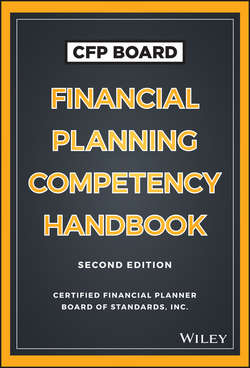Читать книгу CFP Board Financial Planning Competency Handbook - Board CFP - Страница 33
На сайте Литреса книга снята с продажи.
PART One
Introduction
CHAPTER 3
Financial Services Regulations and Requirements
PROFESSIONAL PRACTICE CAPABILITIES
ОглавлениеEntry-Level: An entry-level financial planner can identify key elements of the following securities licensing examinations and match each license with the appropriate product sale:
■ Series 6: Mutual Fund and Annuity Representative
■ Series 7: General Securities Representative
■ Series 24: General Securities Principal
■ Series 26: Investment Company and Variable Contracts
■ Series 55: Equity Trader Limited Representative
■ Series 63: Uniform Securities Agent State Law
■ Series 65: Uniform Investment Adviser Law
■ Series 66: Uniform Combined State Law (combines Series 63 and 65 examinations)
In addition to these securities licenses, entry-level financial planners who provide life, accident/health, property and casualty, personal, crop, or title insurance services can recall state licensing rules and regulations. They can pass the test for a basic life insurance license if required. Entry-level financial planners can also identify SEC and state investment advisor registration requirements, regardless of their current compensation method.
Competent: The transition from entry-level to competent status in the financial planning profession tends to be relatively quick. This is the result of increasing state and federal regulation of the financial services marketplace and an amplified attention by firms to educate their employees on regulation compliance. Many proficient financial planners hold the Series 6, Series 7, or Series 63 and 65 licenses, depending on the services provided. One who provides services for a fee should also be registered either as an investment adviser or as an investment advisor representative. Generally, planners who manage for a fee less than $100 million in client assets must register at the state level.
Expert: An expert commission-based or fee-based financial planner will additionally hold a Series 24 General Securities Principal license. This license verifies that the financial planner fully understands and can interpret and enforce all FINRA regulations, brokerage firm operations, and other supervisory requirements. In other words, a Series 24 license allows an individual to supervise and manage brokerage firm operations. An expert financial planner who is compensated by way of client fees holds a Series 65 license or a combination of Series 66 and 7 licenses,34 or is currently certified as a CFP professional.35
34
K. C. Garrett and J. E. Grable, “State Investment Adviser Representative Examination and Waiver Requirements,” Journal of Personal Finance 6, no. 1 (2007): 38–43. Available at: www.iarfc.org/documents/issues/Vol.6Issue1.pdf.
35
Other certifications can be used to waive licensure requirements for investment advisers, including the ChFC, PFS, CFA, and CIC. See Garrett and Grable (2007) for more information.
